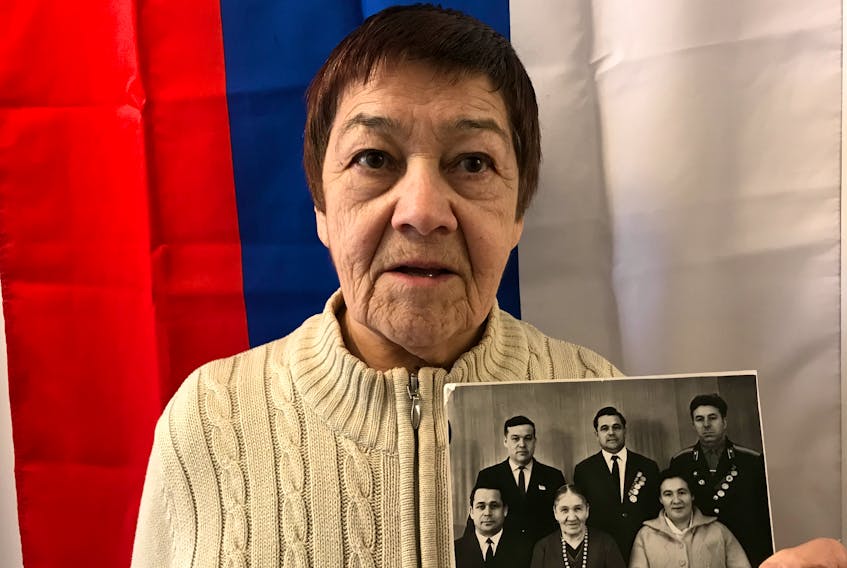Ismagil Miftakhov still remembers the day he saw Soviet soldiers escort German Field Marshal Friedrich Paulus into captivity amid the frozen, snow-covered rubble of Stalingrad.
It was Jan. 31, 1943, and Miftakhov had just survived the Battle of Stalingrad, a five-month slaughter that left perhaps one million people dead as the Soviet Union desperately defended the city against Adolf Hitler’s Nazi army.
His reward was watching 91,000 German soldiers herded through the snow toward prisoner camps by Red Army guards brandishing submachine guns. The enemy soldiers emerged from the ruins of Stalingrad dressed in rags, their cheeks sunken after starving for weeks.
Seventy-five years later, his younger sister Ramzia Akhmetova pays tribute to her big brother from her New Glasgow home today on Russia’s Victory Day, the anniversary of when Germany surrendered during the Second World War.
“I would say to him thank you, that he brought peace to people,” said Akhmetova. “He came back alive.”
Her family were fortunate: all 11 Miftakhov children survived the war.
Ismagil Miftakhov is now 96 and lives in the Russian city of Ufa, from where he described his wartime experiences to The News.
Like millions of other Russians, his war began on June 22, 1941, when more than three million Nazi soldiers invaded the Soviet Union.
Millions of Soviet soldiers were killed or captured in those early months and many more civilians were murdered by German forces, who deemed both Russians and Jews to be racially inferior.
Even as a full-scale genocide unfolded on Soviet soil and the Red Army was pushed back deep into Russia, Miftakhov’s luck held out.
At Stalingrad in 1942, Miftakhov’s job was setting up combat radios. This meant running through the trenches with communication wires, setting up the equipment that let Red Army troops mount an effective defence against the Nazis.
As Miftakhov ran with his wire coils, he often came under enemy artillery bombardment or machine-gun fire.
In the war’s early months, Soviet soldiers were also pounded by German ‘Stuka’ dive bombers or cut down by advancing Panzer tanks.
But Miftakhov survived it all.
“You learn, being in the war. The war teaches you,” said Miftakhov. “Wherever the bullets are, above your head, whoosh, you hear the noise so you drop down. You learn, don’t lift your head.”
After Stalingrad, the Red Army finally went on the attack. By 1943, the Soviet Union was receiving huge amounts of weapons, ammunition, trucks and food from the United States.
Meantime, the Soviets’ own factories were churning out their own planes and tanks, including the world-famous T-34, after the production plants were hurriedly moved east ahead of the German advance.
Advancing westwards, the Soviets liberated the port city of Rostov and attempted to recapture the city of Kharkov in eastern Ukraine.
Miftakhov’s next big battle was Kursk in July - August 1943. There, Soviet forces successfully stood their ground against a fresh German attack.
He again ran his radio wires through a deep network of defensive trenches around the city, built up by the Soviets months in advance of the fighting.
After Kursk, Miftakhov advanced with the Red Army, which liberated Ukraine and western Russia.

By 1944, huge Soviet offensives lifted the Siege of Leningrad (today’s St. Petersburg) and pushed into Eastern Europe. Romania switched sides and joined the Soviets, while fighting between Red Army and German troops raged across Poland.
“I was in the forests, in the woods going through all of Europe until Berlin,” recalled Miftakhov.
In the war’s last months, Soviet soldiers liberated the Auschwitz death camp in southern Poland, uncovering evidence of the Holocaust. This was the mass extermination of six million Jews, plus millions more Slavs, gypsies, homosexuals, political dissidents and others from occupied Europe.
By April 1945 the Red Army was fighting its Nazi enemies on the streets of Berlin and eastern Germany was overrun by the Soviets.
On April 30, Hitler shot himself in his Berlin bunker. The Germans surrendered to the Allies on May 8, 1945.
After the war, Miftakhov stayed in Berlin for two years, helping to rebuild Germany’s devastated capital.
Despite everything he saw, Miftakhov bears no ill will towards the German people.
“German people are good and when there is no war, there is friendship and trade and business,” he said.








